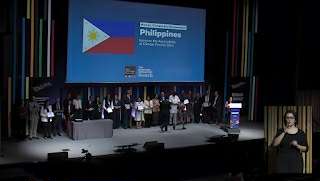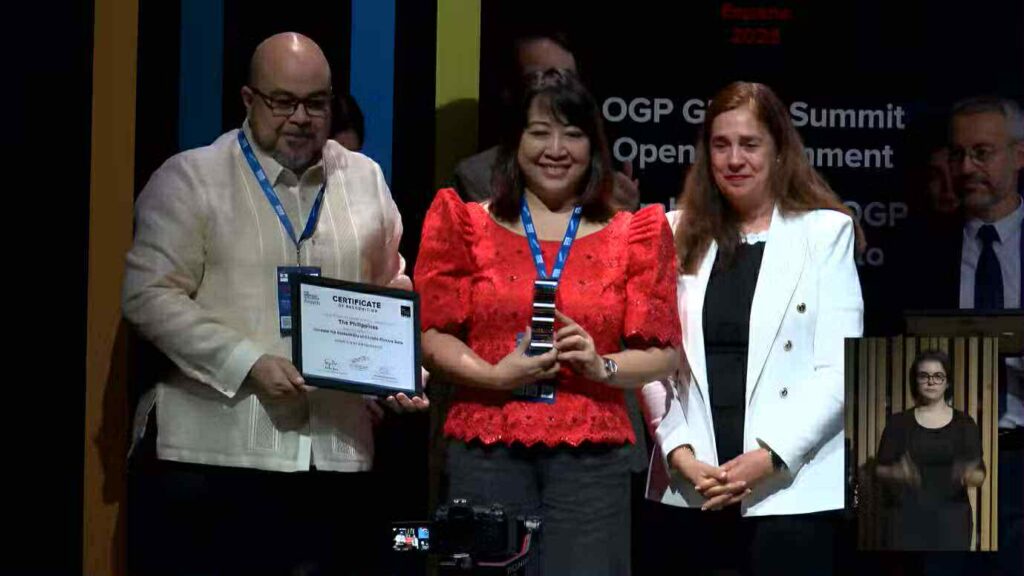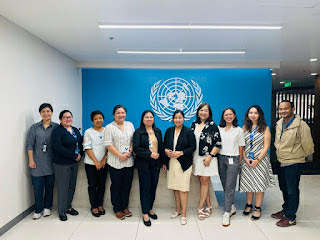Vitoria-Gasteiz, Spain, 14 October 2025 — The Climate Change Commission’s (CCC) Project IMPACT, which aims to further strengthen climate finance transparency, accountability, and openness, secured the top award under the Climate and Environment theme at the 2025 Open Gov Challenge. The award was given during the Open Government Partnership (OGP) Global Summit in Vitoria-Gasteiz, Spain.

Out of 20 global climate and environment commitments, the Philippines stood out for its innovative, citizen-centered approach, securing its place as a leading country in open and participatory climate governance.
The project, officially titled “Inclusive Monitoring and Participation for Accountability in Climate Transformation (IMPACT)” received the Thematic Award for Climate and Environment. It has been officially recognized for its distinctive approach, setting it apart from the other 19 climate-related commitments from national and local governments worldwide. Project IMPACT is designed by and for citizens, incorporates simplified geo-tagged data visualization with social media functionalities, operates through both online and offline modes to ensure inclusivity, and completes a full feedback loop, allowing citizens to report issues and receive government responses. These features exemplify the core principles of OGP and democratic governance.

CCC Vice Chairperson and Executive Director Robert E.A. Borje underscored the Commission’s commitment to the principles of transparency, accountability, and participation in climate governance.
“Accessible climate finance data builds trust and strengthens accountability among government, civil society, and the public. We are dedicated to empowering citizens and communities to take part in shaping and tracking climate action, making every peso allocated for climate response traceable, effective, and responsive to their needs,” Borje said.
The CCC submitted a challenge proposal to further strengthen the internal system of Climate Change Expenditure Tagging (CCET) and improve its design through participatory governance, consistent with good governance principles.
The Project IMPACT, submitted to OGP on May 23, 2025, builds on the CCET system institutionalized under Joint Memorandum Circular No. 2015-01 of the CCC, Department of Budget and Management (DBM), and Department of the Interior and Local Government (DILG) to integrate climate adaptation and mitigation into agency budgets and local investment programs. Developed with support from DBM, United Nations Development Programme (UNDP), and the Institute for Climate and Sustainable Cities (ICSC), Project IMPACT will be piloted from 2026 to 2028 in four provinces identified as highly vulnerable under the National Adaptation Plan.
The Philippines’ recognition reflects the nation’s strong and sustained commitment to open governance under the leadership of President Ferdinand R. Marcos Jr., advancing a whole-of-government and whole-of-society approach to strengthen public trust, broaden civic participation, and institutionalize transparent, data-driven decision-making.
This commitment is reinforced by Executive Order No. 31, signed on June 20, 2023, which institutionalized the Philippine Open Government Partnership (PH-OGP) as a multi-stakeholder platform overseeing national OGP commitments. The EO mandates that transparency, accountability, and citizen participation be embedded across all levels of governance.
The CCC emphasized that recognition under the Open Gov Challenge serves as both validation and motivation to strengthen climate finance systems, beyond data tagging, through active engagement of civil society and citizens in monitoring and evaluating climate programs and investments, and closing the feedback loop through timely and effective government response/action. More than a distinction, this establishes a social contract for continuous improvement and a baseline for enhancing climate action through participatory governance.
The CCC, together with government and non-government partners, is committed to continue reinforcing collaboration to ensure that climate finance systems remain open, inclusive, and results-oriented—anchored on the shared goal of a resilient, sustainable, and empowered Philippines.
The Open Gov Challenge, launched in 2023, is a global OGP initiative that invites governments to take ambitious, citizen-centered actions across 10 reform themes, including Climate and Environment. This year’s awards celebrated countries demonstrating measurable progress, innovation, and inclusive collaboration, with a total of 163 commitments submitted globally. The Philippines’ recognition under the OGP platform reflects its progress in embedding open government principles in climate governance, positioning the country among global leaders in climate transparency, citizen participation, and environmental accountability. It marks a commitment to a social contract for continuous improvement and sets a baseline for how climate governance can be made more effective and inclusive.


